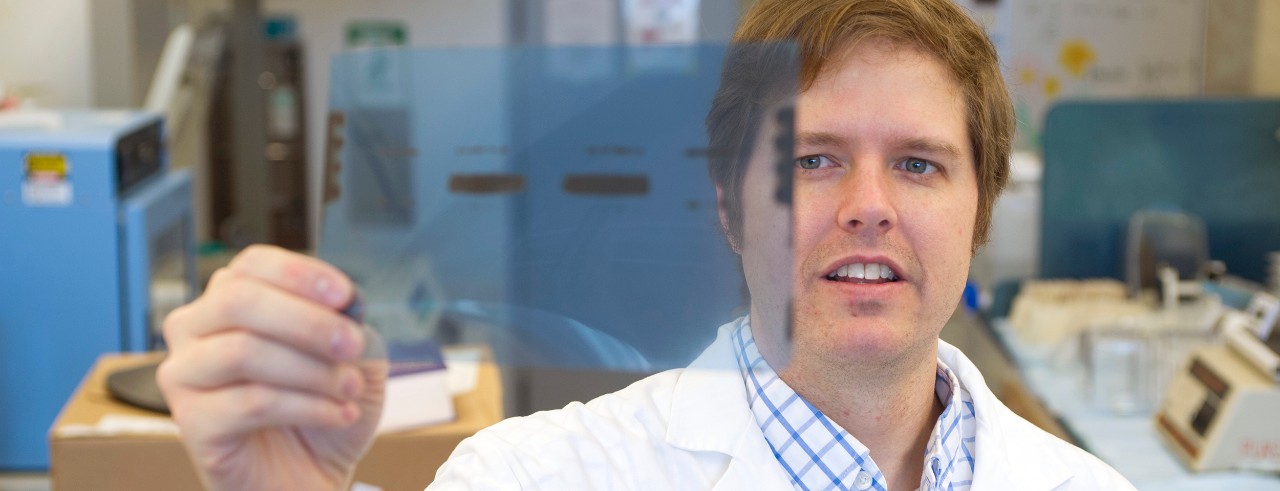
UC researcher receives $4M in federal funds
These grants will help Tom Cunningham, PhD, study how a key enzyme in the metabolism of cells contributes to developmental disorders and cancer.
A University of Cincinnati cancer biology scientist has been awarded nearly $4 million in federal funding to continue his research on how altered activity of a key enzyme in the metabolism of cells contributes to developmental disorders and cancer.
Tom Cunningham, PhD, assistant professor of cancer biology, received two, five-year grants—a National Institute of General Medical Sciences R35 Maximizing Investigators' Research Award ($401,250 x five years) and a National Cancer Institute R01 ($367,144 x five years)—with hopes of discovering more about metabolic processes that control normal development and cancer.
This type of research aligns with President Pinto's innovation agenda, one of the platforms of Next Lives Here.
“My lab has made discoveries over the years that allow us to better appreciate the role of a particular enzyme essential to coordinating the metabolic processes of cells; it’s the gatekeeper of nucleotide production in all life, from bacteria to humans,” he says, referring to phosphoribosyl pyrophosphate synthetase (PRPS). “Humans and most other animals express two highly related isoforms, or protein variants, of this enzyme (PRPS1 and PRPS2). Mutations found in the PRPS1 gene in human patients with various developmental disorders highlight its essential role during normal development.
“In contrast, no disease-causing mutations have been found in the human PRPS2 gene, and no obvious defect has been detected in animal models engineered to lack PRPS2, indicating the PRPS2 isoform is not essential for normal development. Although the role of PRPS2 during normal development remains mysterious, the non-essential PRPS2 enzyme is frequently overproduced by cancer cells and is required for tumor formation, therefore making it an attractive therapeutic target.”
Cunningham says his two grants and the research that accompanies them go hand-in-hand: His R35 grant will be used to further examine these two variants and their roles during development in mammals. His R01 grant seeks to determine how and why cancer cells hijack the function of this key enzyme to drive tumor development.
“We will use disease-mimicking animal models of PRPS1 superactivity and loss of function that enable us to study how the mutations lead to the various disease manifestations displayed in human patients,” he says. “Collectively, our team hopes to better understand the complicated role of nucleotides in cellular metabolism and how their abnormal production, breakdown, transport or utilization contributes to disease. We also hope these studies will open up new avenues for understanding the metabolic weaknesses of cancer cells which could lead to new, targeted therapeutic strategies for patients.”
Receiving two federal grants of this caliber is quite rare for a young investigator in this field. Cunningham has only been running his own lab for three years and previously received a Scholar Award from the V Foundation for Cancer Research in 2017—the first recipient of that prestigious award in UC’s history.
“The V award served as a springboard for these two larger National Institutes of Health-sponsored awards. Combining the funding received from these two new awards with the outstanding scientific environment and resources present within the Department of Cancer Biology and the UC College of Medicine at large, my research team is now poised to make the types of impactful discoveries that are transformative for our understanding and treatment of human disease,” he says.
Related Stories
Discovery Amplified expands research, teaching support across A&S
February 19, 2026
The College of Arts & Sciences is investing in a bold new vision for research, teaching and creative activity through Discovery Amplified. This initiative was launched through the Dean’s Office in August 2024, and is expanding its role as a central hub for scholarly activity and research support within the Arts & Sciences (A&S) community. Designed to serve faculty, students, and staff, the initiative aims to strengthen research productivity, foster collaboration, and enhance teaching innovation. Discovery Amplified was created to help scholars define and pursue academic goals while increasing the reach and impact of A&S research and training programs locally and globally. The unit provides tailored guidance, connects collaborators, and supports strategic partnerships that promote innovation across disciplines.
Blood Cancer Healing Center realizes vision of comprehensive care
February 19, 2026
With the opening of research laboratories and the UC Osher Wellness Suite and Learning Kitchen, the University of Cincinnati Cancer Center’s Blood Cancer Healing Center has brought its full mission to life as a comprehensive blood cancer hub.
UC Digital Futures and Cincinnati Fire Museum launch educational video game
February 17, 2026
A new collaboration between the University of Cincinnati's Digital Performance Lab (DP Lab), CCM Acting, UC's School of Information Technology, and the Cincinnati Fire Museum is using gaming technology to bring essential fire safety education to children. The project titled Fire Escape is an interactive video game designed to teach K-12 students how to respond safely during a house fire. It was developed through Digital Futures research support, student game development, and guidance from local fire safety professionals.
